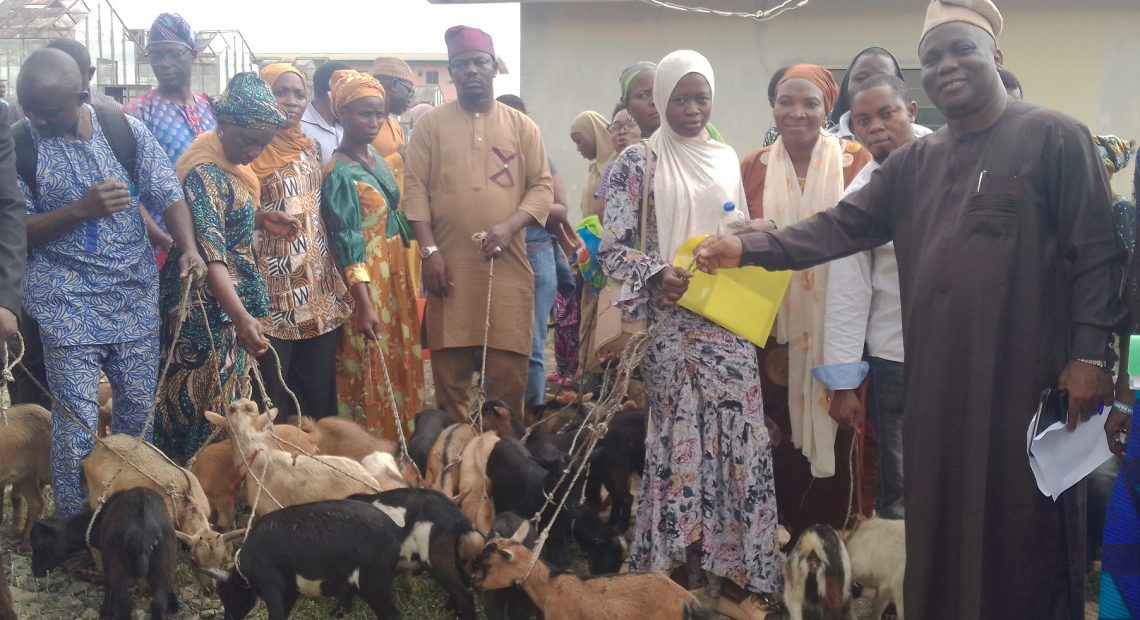

By Rotimi Famakin
Eighty farmers have been trained on small ruminant farming business by the Federal Ministry of Agriculture and Food Security to boost their income.
The event which was held at the Nigeria Quarantine Service Hall, Apata, Ibadan was targeted at women and youths drawn from Ogun and Oyo States.
Our correspondent reports that the eighty beneficiaries were given a male and female goat each as well as lecture on the livestock rearing system for high yield.
The lecture which lasted between three to four hours focused on the reproduction, feeding, disease prevention and control in goat, application of indigenous knowledge in the management of the animal as well as its market value.
In his presentation on small ruminants (sheep and goat) production, the guest lecturer, Dr Yemi Popoola who is also an animal production scientist at the Institute of Agriculture Research and Training, I.A.R and T, Moor Plantation, Ibadan, said sheep and goats should be fed with quality and sufficient organic feed to get the best out of them.
Dr Popoola who said diseases could be transferred from one infected livestock farm to another, encouraged the livestock farmers to be sensitive to the reproductive signs in sheep and goat while being mindful of internal and external parasites.
He explained that in case of any symptoms of an infection the farmers should consult veterinary doctors.
“The protein value of goat cannot be quantified”.
“Aside the milk which the world needs, the meat of goat can be used for making suya, kilichi, dankunama, isi ewu, pepper soup among other things” the don noted.
Dr Popoola who supported the application of indigenous knowledge in goat and sheep rearing, stressed the need for the small holders farmers to aggregate themselves into cooperative so as to access funds to fully grow their businesses.
Earlier in an address of welcome, the permanent secretary, Federal Ministry of agriculture And Food Security, Dr Earnest Umakhihe represented by Director II Federal Department of Agricultural Extension Services, Dr Adeola Lordbanjou, said the small ruminants sub-sector contributes one third of the twenty-one percent of Nigeria’s gross domestic product, GDP.
Dr Umakhihe who said the training programme and the starter pack given the selected beneficiaries were not palliatives, advised the farmers to desist from any attempt of killing the animals for food.
He added that their performance in their respective locations would be tracked to ensure the programme achieve its long term mandate.
“As you are aware, agriculture remains important in Nigeria with 36% of the nation’s labour force employed in the sector. This makes it the second largest employer of labour”.
“The livestock sub-sector is an integral part of food security and national development in Nigeria. The Federal Ministry of Agriculture and Rural Development estimates that the subsector contributes one-third of the 21% of the GDP of agricultural subsector to the national economy”.
“The livestock sector plays a critical role in meeting the country’s food security needs, as well as improving soil fertility and nutrient cycling through manure production for large agricultural production” Dr Umakhihe explained.
The Oyo State Commissioner for Agriculture and Natural Resources, Mr Olasunkanmi Olaleye represented by Director of Extension, Mr Rasaq Maruff lauded the intervention saying the target group needed to be empowered to overcome the current economic crises.
In their separate goodwill messages, the Ogun State coordinator, Federal Ministry of Agriculture and Food Security, Dr Ayo Ajayi and her Oyo State counterpart, Kakulu Omonele represented by an agric officer, Mrs Bilkis Abdulateef said the effect of the present economic situation in the country needed strategic solution, adding that the intervention would help women and youths who are mostly affected to overcome their challenges.
National President, Goat and Sheep Farmers Association of Nigeria, Alhaji Abimbola Salami said the two livestock would multiply to twenty-one given the two to three year targets given to the beneficiaries when the modern and indigenous systems of rearing the animals were adequately followed.
Some of the beneficiaries commended the federal government intervention and pledged to fully utilize the opportunity for the sustenance of livestock farming.
High point of the event was a Question and Answer session and exchange of field experiences on goat and sheep rearing.
Subscribe to our Telegram and YouTube Channels also join our Whatsapp Update Group